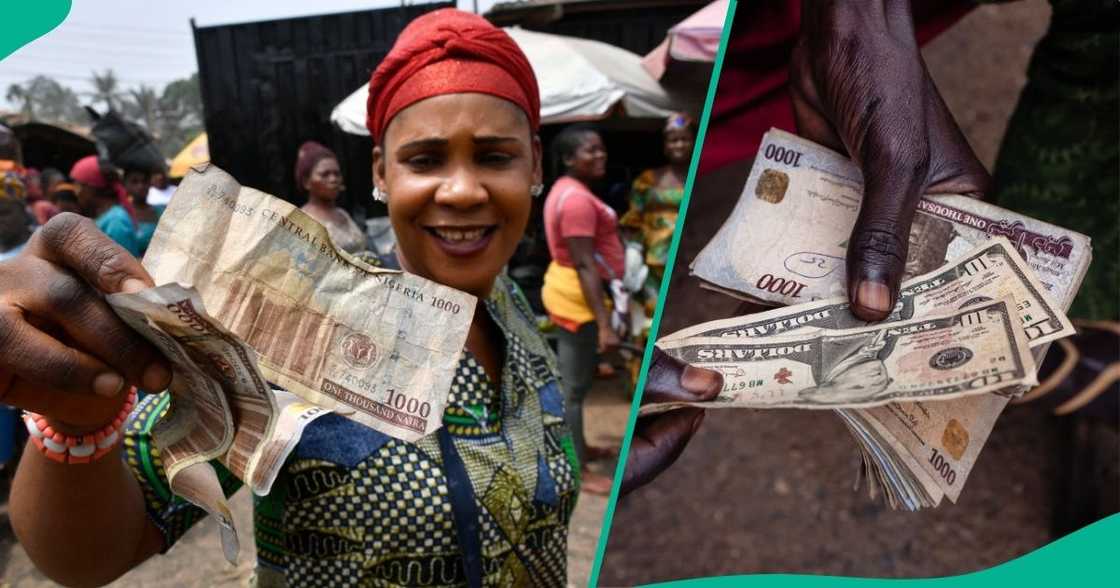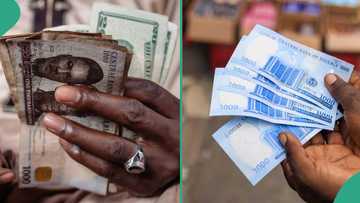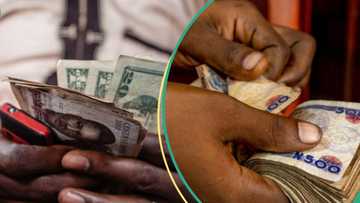Naira Sinks Lower in Official Market, Nears N2,000/$ in Black Market
- The local currency, the naira, depreciated further in the official window and remained flat in the parallel market
- Data from official sources show that the naira closed at N1,660.49 per dollar on Thursday, October 17, 2024
- In the parallel market, commonly referred to as the black, the naira traded at N1,700 per dollar, the same rate as the previous day
Legit.ng’s Pascal Oparada has reported on tech, energy, stocks, investment and the economy for over a decade.
Despite the various reforms of the Central Bank of Nigeria (CBN) to prevent the naira from plummeting further, the Nigerian currency continues to sink lower in all foreign exchange markets.
Analysts have stated that the apex bank's irregular interventions in the FX markets are to blame for the naira’s woes.

Source: Getty Images
Naira crashes more
On Thursday, October 17, 2024, the local currency sank further in the official window to trade at N1,660.49 per dollar as against N1,659 it traded on Wednesday, October 16, 2024.
Currency dealers in the FX market quoted the dollar at a high of N1,670 and a low of N1,540 per dollar, leaving a margin of N130.
The development comes despite the increase in foreign exchange turnover in the official window.
According to data from the FMDQ Exchange, currency supply in the FX market on Thursday, October 17, 2024, hit $330.18 million, an increase from the $177.10 million recorded the previous day.
Spot rate gap widens to N130 in official window
The naira also took a significant hit in the parallel end of the foreign exchange market, closing at N1,700 per dollar, the same rate it traded the previous day.
Dealers still maintained that they were not getting enough FX supplies from the CBN, which is the reason for the high demand for the US dollar in the black market
Janet Ogochukwu, a senior banker and economist, blamed the CBN's intermittent and irregular interventions in the FX markets for the naira’s woeful performance.
Expert proffers solutions to naira’s crash
She stated that despite the deliberate float of the local currency, some buffers should be in place to prevent a total collapse of the naira.
“There is no absolute currency floating anywhere in the world. Even the Chinese currency, one of the most devalued globally, is still being managed to avoid complete collapse.
“The CBN should adopt a managed float since the country is not earning enough FX from exports. The bulk of the inflows are from diaspora remittances, domestic dollar bonds and crude oil sales,” she said.
CBN discloses sources of FX inflows
CBN recently disclosed that foreign exchange inflows via International Money Transfer Operators (IMTOs) rose by 47% to $2.33 billion in the first six months of this year relative to the $1.58 billion recorded in 2023.

Read also
Naira gets new ranking as World Bank releases list of Africa’s worst performing currencies in 2024
The development comes amid CBN policies allowing eligible IMTOs to access naira liquidity at the official forex window.
Recently, the apex bank released some measures to boost the FX markets and increase remittance inflows via formal channels.
CBN clarifies role In the forex market
Legit.ng earlier reported that Olayemi Cardoso, the governor of the Central Bank of Nigeria (CBN), had clarified that the apex bank does not determine the country’s exchange rate based on prevailing economic fundamentals.
Cardoso disclosed this while speaking as a panelist at the launch of the Nigeria Development Update in Abuja.
Vanguard reports that during his address, the CBN governor expressed optimism about strengthening Nigeria’s foreign exchange stability through closer collaboration with fiscal authorities.
Proofread by Kola Muhammed, journalist and copyeditor at Legit.ng
PAY ATTENTION: Сheck out news that is picked exactly for YOU ➡️ find the “Recommended for you” block on the home page and enjoy!
Source: Legit.ng




